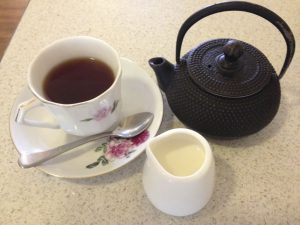Drinking tea offers benefits to our mind and body. It is an opportunity to pause, relax and savour this special ritual. Traditional Eastern medicine promotes a wide range of health benefits of tea, especially green varieties. Western science is now accumulating evidence in a number of health areas too. So what is so special about this beverage?
History of tea
Tea drinking dates back to 2737 BCE. It is believed that the second emperor of China discovered it when leaves from the Camellia sinensis (tea plant) blew into his cup of hot water. Tea was introduced to America around 1650 and England in the late 1650s. It was first sold in England in 1826. In 1870 Twinings of England commenced blending teas for retail.
White, green, black or red?
The four main styles of tea are white, green, oolong and black. Red (Rooibos) is not actually a tea, as it isn’t made from the Camellia sinensis plant. Hot beverages made from Rooibos and herbs such as peppermint, spices and other plants like camomile are tisanes, not teas.
White tea is made from the young leaves of the Camellia sinensis plant. These leaves are harvested in early spring and do not contain chlorophyll, so the leaves are silvery white in colour rather than green. White and green varieties are the least processed. They are quickly steamed or heated and then dried. The processing of black and oolong teas involves a fermentation process that deepens the colour. Oolong has a shorter processing time and lighter colour and flavour compared to back tea.
White, green, oolong and black teas provide different compounds, which benefit health. These compounds are called polyphenols, a type of flavonoid with strong antioxidant properties. Antioxidants protect cells from damaged caused by free radicals. The polyphenols in tea are a particular variety called catechins.
Improve your physical health
Research to date suggests that drinking tea may:
- Boost immune function
- Improve gut function
- Reduce high blood pressure
- Reduce the risk of heart disease, type 2 diabetes and some cancers.
The research studies conducted vary in type and quality. Research conducted invitro, cultured cells, and in animals provide valuable information about how the active components of tea may benefit human health. Population studies, which compare the health of people who drink tea compared to those that do not, also provide some insight into possible benefits. However population studies cannot attribute the benefits of drinking tea compared other factors, such as those achieved from living a healthy lifestyle. Intervention studies that control for as many factors as possible, then compare tea drinkers to non-tea drinkers provide a higher level of evidence.
Research evidence is growing in regards to the relationship between drinking tea and reducing the risk of heart disease and cancer. The biological action of tea is still under investigation, but it appears anti-inflammatory and antioxidant processes are involved.
Focus your mind
The presence of theanine, a natural amino acid (building block of protein) helps the mind to focus. It also negates the adrenalin rush from caffeine, as experienced when drinking coffee.
Connect and share
The ritual of making and drinking tea can be enjoyed alone or with company. It can become a mindfulness practice when you are alone. Your choice of tea, brewing method and taking the time to sit and savour the aroma and flavour contribute to a calm state of being. Many good stories have been shared over a cup of tea adding to our feelings of connectedness with others.
Make drinking tea a part of your day
White, green, oolong and black tea all provide good sources of catechins. I recommend a variety of teas. White and green teas are lower in caffeine so may be more suitable after lunch. Savour the natural flavour of tea without added sugar or sweetener. The addition of milk to black tea provides a variety in flavour without reducing the health benefits of the natural flavonoids. Drinking tea can be included as part of your healthy approach to eating and living.
